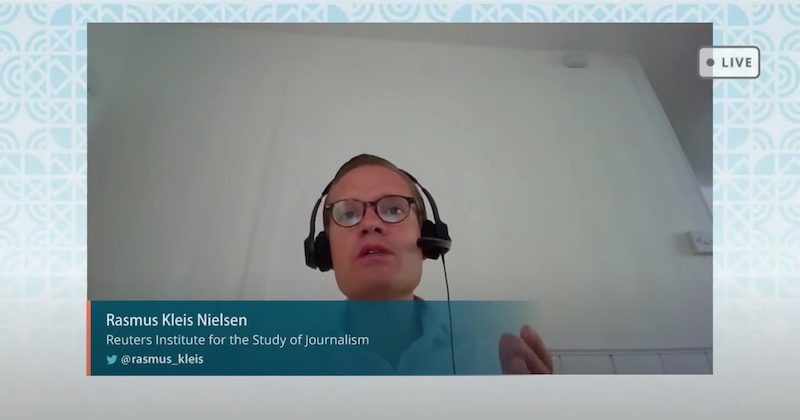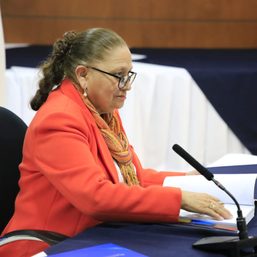SUMMARY
This is AI generated summarization, which may have errors. For context, always refer to the full article.

MANILA, Philippines – Amid the “infodemic” or the deluge of misinformation going around about COVID-19, a study said news media remain a reliable source to know more about the disease.
A survey conducted in late March to early April showed “a clear positive and significant association between relying on news organizations as a source of information about the coronavirus and knowing more about the disease,” said Rasmus Kleis Nielsen, who led the study. He is the director of the Reuters Institute for the Study of Journalism at the University of Oxford in London, United Kingdom.
Nielsen talked about the results of their research in a keynote presentation on the third day of the Global Fact 7 held online on Wednesday, June 24. The survey in the study covered nationally representative samples of internet users in 6 countries: Argentina, Germany, South Korea, Spain, United Kingdom, and the United States.
“On average, about two-thirds say they have relied on news organizations, ranging from a low of 47% in Germany to a high of 77% in South Korea,” he said.
Nielsen noted, though, that signs of “news fatigue” were emerging.
“Between half and a quarter of our respondents say they have not used news as a source of information about the coronavirus in the past week,” he said.
Meanwhile, the study did not find “similar consistent significant associations, neither positive nor negative, between relying on platforms and how informed people are.”
“In a few countries are negative associations for some specific types of platforms – specifically video-sharing sites and messaging applications. And in a few countries, we find a small significant association for search. [For] social media, we find no positive or negative association in any of the 6 countries covered in our research,” Nielsen said.
“Overall, the only source or platform of information we find consistently associated with how much people know about coronavirus disease is news, which demonstrably help people in most of the countries researched to be more informed about the disease,” he added.
Knowledgeable public
As to how knowledgeable the respondents were about COVID-19, Nielsen said that most do relatively well. They were asked questions based on factual information mostly from the official website of the World Health Organization.
“A clear majority answers most of the questions we posed to them correctly, and many of those who do not answer correctly simply say that they don’t know,” said Nielsen.
The study also did not show convincing evidence that most people are easily fooled and misled, said Nielsen.
“In fact, most people come across in our research as pretty discerning, rather skeptical, and relatively well-informed” despite their differences in beliefs and political views, he continued.
The study also found that people encounter misinformation generally from ordinary people they don’t know who often share things online, followed by politicians who utilize social media. In addition, he noted that in some countries, “quite a large minority are concerned about news media as a potential source of false information.”
Nielsen, however, stressed that the observations in this study may vary from country to country, given different contexts.
Collaboration
Nonetheless, Nielsen emphasized the need for all sources of information to work together to inform the public better.
“No one can lift all of these on their own. I think we need to collaborate even as we should often also compete with and criticize one another,” said Nielsen.
He encouraged researchers and academics to do more work on how “infodemics” are playing out in the world.
“I hope there will be more attention to sources and platforms of misinformation, as well as this point about outcomes. Are people, in fact, misinformed?” he said.
Nielsen also noted that while people turn to journalists for information during a crisis, the incidence of “news fatigue” shows that journalists are “not reaching the whole public and not serving all communities well.”
Much more needs to be done by online platforms despite a steady stream of initiatives, he said.
“And perhaps also reason to note that people are often skeptical of the governments that platforms increasingly collaborate with,” he added.
As for politicians, Nielsen urged them to wield their power responsibly.
“Prominent politicians often set the news agenda, they take collectively binding decisions, and they influence their most loyal supporters’ attitudes and behaviors. With this power comes responsibility, and it’s clear that some politicians are more interested in the power part of that than the responsibility part of it,” he said.
Nielsen reiterated: “No member of the public gets there on his or her own. They get there in part by taking a risk, and relying on independent, professional journalists and fact-checkers, and perhaps occasionally researchers.”
“And we have to show them every day they are right to trust us, as I know all of you strive to do,” he added. – Rappler.com
Add a comment
How does this make you feel?


![[WATCH] Try This: Empanada Salteña from Argentina](https://www.rappler.com/tachyon/2023/04/try-this-empanada-saltena-argentina.jpg?resize=257%2C257&crop=765px%2C0px%2C1037px%2C1037px)


There are no comments yet. Add your comment to start the conversation.